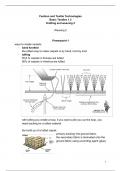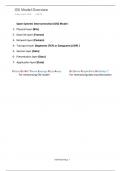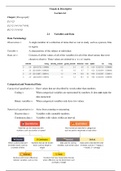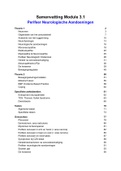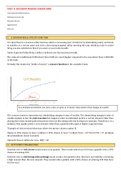Laura Heijnen – Organisational Psychology: Performance at Work
Problem 1. The best and the rest
1. Part time job at Halbert Feijn
What is job performance, and what are characteristics?
ü Motowidlo, Borman, & Schmit (1997) – A theory of individual differences in task and contextual
performance
ü Sonnentag, & Frese (2002) – Performance concepts and performance theory
Relevance of individual performance
- Importance for organisations: to meet goals, deliver products + services, and achieve
competitive advantage.
- Importance for individual: satisfaction, feelings mastery + pride. Often rewarded:
future career development + success, promotion.
- Individual performance measures used in many studies.
Definition of performance
- Differentiate between:
o Action aspect (i.e., behavioural): what individual does in work situation; only
behaviour relevant for organisational goals (= judgemental + evaluative
processes). Also only actions which can be scaled/measured.
o Outcome aspect: consequence/result of individual’s behaviour. Depend on
factors other than behaviour (e.g., perfect reading lesson = action, but still bad
skills = outcome).
o Criteria needed to evaluate action (because referring to organisation) =
considering outcome aspect à intertwined. Also: which one is performance?
Performance as multi-dimensional concept
- Task performance: individual’s proficiency with which he/she performs activities which
contribute to organisation’s ‘technical core’.
o Direct (technical core, e.g., production workers) vs. indirect (technical process,
e.g., managers/staff personnel).
o Is itself multi-dimensional: job-specific task proficiency, non-job-specific task
proficiency, written + oral communication proficiency, supervision + (partly)
management/administration. All dimensions have subfactors which might vary
between jobs (e.g., management/administration = planning and organising +
training and coaching).
o Innovation + customer-oriented behaviour becoming increasingly important
because more emphasis on customer service.
o Has positive contribution values because they help transformation of raw
materials into goods/services, or directly service organisation’s technical core +
improve capability to produce accordingly.
- Contextual performance: activities which don’t contribute to technical core but which
support organisational, social + psychological environment of organisational goals.
o E.g., helping co-workers, being reliable member, making suggestions about
how to improve work procedures.
o Also in itself multidimensional: 2 types
§ Behaviours aiming at smooth functioning of organisation as it’s at
present moment: altruism, conscientiousness, civic virtue, courtesy +
sportsmanship = organisational spontaneity.
1
, Laura Heijnen – Organisational Psychology: Performance at Work
§ Proactive behaviours aiming at changing and improving work
procedures and organisational processes: persona initiative, voice +
taking charge.
o Has positive contribution values because maintain/improve organisational,
social, or psychological environment necessary for technical core to function
effectively + efficiently.
- Individual differences in task + contextual performance: no differences in motivational
elements. Both contribution values represent ultimate effects on organisational goal
accomplishment, but have different means.
o Hunter: causation from ability to job knowledge + work sample performance;
direct path from job knowledge to work sample performance; direct path from
job knowledge + work sample performance to supervisory ratings of
performance. Ability no direct effect on supervisory ratings à ability à job
knowledge + skill à job performance.
o Campbell: 3 direct determinants of job performance (declarative knowledge,
procedural knowledge and skill + motivation).
o McCrae & Costa: relations between 5 categories à basic tendencies,
characteristic adaptations, objective biography, self-concept + external
influences. Most relevant are first 3.
§ Basic tendencies: fundamental capacities + dispositions that describe
differences between individuals. Define potential for observable
behaviour. Can be inherited/shaped by early experience, but generally
stable + enduring to give consistent direction in life. E.g., sensory-
motor capacities, physical abilities, perceptual styles, learning ability,
verbal ability, spatial ability + personality traits (Big 5).
§ Characteristic adaptations: concrete expressions of abstract basic
tendencies, like specific skills, habits, preferences, attitudes + patterns
of behaviour that people learn as basic tendencies interact with
environments over time. Product of basic tendencies + learning
processes. E.g., general knowledge, language competencies, schemas
and strategies, social skills, technical skills, religious attitudes, moral
values, social and political attitudes, preferences, vocational interests,
habits, daily routines + social roles, declarative + procedural
knowledge.
§ Objective biography: set of overt behaviours that theories of
personality try to predict = job performance.
à Basic tendencies à characteristic adaptations à objective biography.
o Theories have in idea in common that effects of basic individual difference
variables, e.g., ability and personality, on job performance are mediated by
other variables. Mediating variables: knowledge + skills (work sample
performance, Hunter); declarative, procedural knowledge + motivation
(Campbell); characteristic adaptations including variables like knowledge +
skills (McCrae & Costa).
o Also in this theory (Motowidlo): individual differences in personality + cognitive
ability, in combi with learning experiences, lead to variability in characteristic
adaptations that mediate effects of personality + cognitive ability on job
performance.
2
, Laura Heijnen – Organisational Psychology: Performance at Work
§ Cognitive ability: better predictor of task performance à high level
cognitive ability = more likely master + remember relevant facts,
principles + procedures. Also effect on contextual performance: info
processing, memory processes + decision making important for
determining that one kind of interpersonal/social response is more
effective than another.
§ Personality variables: better predictors of contextual performance
(extraversion, agreeableness + conscientiousness). Have strongest
effect on contextual performance, but also some effect on task
performance. More likely to notice that certain patterns of behaviour
are more effective in certain situations + mastering this knowledge
when high on these patterns/traits.
§ Task habits/skill/knowledge: affect task performance by increasing
likelihood that people will perform behavioural episodes that have
positive contribution values because they help organisation’s technical
core.
• Task skill: actually using technical info, performing technical
procedures, handling info, making judgments, solving problems
+ making decisions related to core technical functions. Skill in
applying relevant technical knowledge to perform necessary
actions smoothly, quickly + without error. Together with
cognitive ability mediating effects of ability on job performance.
§ Contextual habits/skill/knowledge: affect contextual performance by
increasing likelihood that people will perform behavioural episodes
that have positive contribution values because they promote viability of
social + organisational network and enhance psychological climate of
technical core.
• Contextual skills: skill in actually carrying out actions known to
be effective for handling situations that call for helping +
coordinating with others. Determined by personality traits
(extraversion + agreeableness).
§ Work habits: patterns of behaviour that people learn over time + can
facilitate/interfere with performance of behaviours that contribute to
accomplishment of organisational goals. Formed through interaction of
basic traits with environmental influences. Not necessarily most
effective.
• Characteristic motivation responses like easy shortcuts in task
execution rather than maximum effectiveness. Also include
characteristic responses to situations that don’t necessarily
reflect motivational processes (e.g., knowing best strategy after
training, but sometimes accidentally getting back in old habit).
• Task work habits: patterns of responses to task situations that
either facilitate/interfere with performance of task behaviours.
Include characteristic ways of using technical info, performing
technical procedures, making decisions, etc. that may/may not
be consistent with the known effective way. Also include
3
Problem 1. The best and the rest
1. Part time job at Halbert Feijn
What is job performance, and what are characteristics?
ü Motowidlo, Borman, & Schmit (1997) – A theory of individual differences in task and contextual
performance
ü Sonnentag, & Frese (2002) – Performance concepts and performance theory
Relevance of individual performance
- Importance for organisations: to meet goals, deliver products + services, and achieve
competitive advantage.
- Importance for individual: satisfaction, feelings mastery + pride. Often rewarded:
future career development + success, promotion.
- Individual performance measures used in many studies.
Definition of performance
- Differentiate between:
o Action aspect (i.e., behavioural): what individual does in work situation; only
behaviour relevant for organisational goals (= judgemental + evaluative
processes). Also only actions which can be scaled/measured.
o Outcome aspect: consequence/result of individual’s behaviour. Depend on
factors other than behaviour (e.g., perfect reading lesson = action, but still bad
skills = outcome).
o Criteria needed to evaluate action (because referring to organisation) =
considering outcome aspect à intertwined. Also: which one is performance?
Performance as multi-dimensional concept
- Task performance: individual’s proficiency with which he/she performs activities which
contribute to organisation’s ‘technical core’.
o Direct (technical core, e.g., production workers) vs. indirect (technical process,
e.g., managers/staff personnel).
o Is itself multi-dimensional: job-specific task proficiency, non-job-specific task
proficiency, written + oral communication proficiency, supervision + (partly)
management/administration. All dimensions have subfactors which might vary
between jobs (e.g., management/administration = planning and organising +
training and coaching).
o Innovation + customer-oriented behaviour becoming increasingly important
because more emphasis on customer service.
o Has positive contribution values because they help transformation of raw
materials into goods/services, or directly service organisation’s technical core +
improve capability to produce accordingly.
- Contextual performance: activities which don’t contribute to technical core but which
support organisational, social + psychological environment of organisational goals.
o E.g., helping co-workers, being reliable member, making suggestions about
how to improve work procedures.
o Also in itself multidimensional: 2 types
§ Behaviours aiming at smooth functioning of organisation as it’s at
present moment: altruism, conscientiousness, civic virtue, courtesy +
sportsmanship = organisational spontaneity.
1
, Laura Heijnen – Organisational Psychology: Performance at Work
§ Proactive behaviours aiming at changing and improving work
procedures and organisational processes: persona initiative, voice +
taking charge.
o Has positive contribution values because maintain/improve organisational,
social, or psychological environment necessary for technical core to function
effectively + efficiently.
- Individual differences in task + contextual performance: no differences in motivational
elements. Both contribution values represent ultimate effects on organisational goal
accomplishment, but have different means.
o Hunter: causation from ability to job knowledge + work sample performance;
direct path from job knowledge to work sample performance; direct path from
job knowledge + work sample performance to supervisory ratings of
performance. Ability no direct effect on supervisory ratings à ability à job
knowledge + skill à job performance.
o Campbell: 3 direct determinants of job performance (declarative knowledge,
procedural knowledge and skill + motivation).
o McCrae & Costa: relations between 5 categories à basic tendencies,
characteristic adaptations, objective biography, self-concept + external
influences. Most relevant are first 3.
§ Basic tendencies: fundamental capacities + dispositions that describe
differences between individuals. Define potential for observable
behaviour. Can be inherited/shaped by early experience, but generally
stable + enduring to give consistent direction in life. E.g., sensory-
motor capacities, physical abilities, perceptual styles, learning ability,
verbal ability, spatial ability + personality traits (Big 5).
§ Characteristic adaptations: concrete expressions of abstract basic
tendencies, like specific skills, habits, preferences, attitudes + patterns
of behaviour that people learn as basic tendencies interact with
environments over time. Product of basic tendencies + learning
processes. E.g., general knowledge, language competencies, schemas
and strategies, social skills, technical skills, religious attitudes, moral
values, social and political attitudes, preferences, vocational interests,
habits, daily routines + social roles, declarative + procedural
knowledge.
§ Objective biography: set of overt behaviours that theories of
personality try to predict = job performance.
à Basic tendencies à characteristic adaptations à objective biography.
o Theories have in idea in common that effects of basic individual difference
variables, e.g., ability and personality, on job performance are mediated by
other variables. Mediating variables: knowledge + skills (work sample
performance, Hunter); declarative, procedural knowledge + motivation
(Campbell); characteristic adaptations including variables like knowledge +
skills (McCrae & Costa).
o Also in this theory (Motowidlo): individual differences in personality + cognitive
ability, in combi with learning experiences, lead to variability in characteristic
adaptations that mediate effects of personality + cognitive ability on job
performance.
2
, Laura Heijnen – Organisational Psychology: Performance at Work
§ Cognitive ability: better predictor of task performance à high level
cognitive ability = more likely master + remember relevant facts,
principles + procedures. Also effect on contextual performance: info
processing, memory processes + decision making important for
determining that one kind of interpersonal/social response is more
effective than another.
§ Personality variables: better predictors of contextual performance
(extraversion, agreeableness + conscientiousness). Have strongest
effect on contextual performance, but also some effect on task
performance. More likely to notice that certain patterns of behaviour
are more effective in certain situations + mastering this knowledge
when high on these patterns/traits.
§ Task habits/skill/knowledge: affect task performance by increasing
likelihood that people will perform behavioural episodes that have
positive contribution values because they help organisation’s technical
core.
• Task skill: actually using technical info, performing technical
procedures, handling info, making judgments, solving problems
+ making decisions related to core technical functions. Skill in
applying relevant technical knowledge to perform necessary
actions smoothly, quickly + without error. Together with
cognitive ability mediating effects of ability on job performance.
§ Contextual habits/skill/knowledge: affect contextual performance by
increasing likelihood that people will perform behavioural episodes
that have positive contribution values because they promote viability of
social + organisational network and enhance psychological climate of
technical core.
• Contextual skills: skill in actually carrying out actions known to
be effective for handling situations that call for helping +
coordinating with others. Determined by personality traits
(extraversion + agreeableness).
§ Work habits: patterns of behaviour that people learn over time + can
facilitate/interfere with performance of behaviours that contribute to
accomplishment of organisational goals. Formed through interaction of
basic traits with environmental influences. Not necessarily most
effective.
• Characteristic motivation responses like easy shortcuts in task
execution rather than maximum effectiveness. Also include
characteristic responses to situations that don’t necessarily
reflect motivational processes (e.g., knowing best strategy after
training, but sometimes accidentally getting back in old habit).
• Task work habits: patterns of responses to task situations that
either facilitate/interfere with performance of task behaviours.
Include characteristic ways of using technical info, performing
technical procedures, making decisions, etc. that may/may not
be consistent with the known effective way. Also include
3

